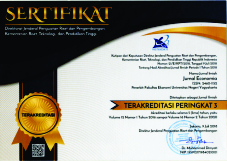Cooperative Student for Developing Students Character
Downloads
Abstract: Cooperative Student for Developing Students Character. The purpose of this study was to analyze the implementation of cooperative student development model as a model as character education in Vocational High School (SMK). The samples of this study are 20 SMK in DIY. Cooperative Student development, as a model of character education, uses the Research and Development. This study managed to compile a guidebook of Cooperative Student development. The study also proved that the activities in student cooperatives were able to develop the character values such as kinship, independence, responsibility, and democracy.
Keywords: Cooperative development, character education.
Abstrak: Koperasi Sekolah Sebagai Wadah Pengembangan Karakter Siswa. Tujuan penelitian ini adalah menganalisis implementasi model pengembangan koperasi siswa (kopsis) sebagai model pendidikan karakter di SMK. Penelitian ini mengambil sampel sekolah sebanyak 20 SMK di Provinsi DIY. Pengembangan kopsis sebagai model pendidikan karakter menggunakan Research and Development. Penelitian ini berhasil menyusun buku panduan penerapan model pengembangan kopsis. Penelitian ini juga berhasil membuktikan bahwa kegiatan berkoperasi mampu menumbuhkan nilai karakter seperti kekeluargaan, kemandirian, tanggung jawab, dan demokrasi.
Kata Kunci: Pengembangan Koperasi, pendidikan karakter
Downloads
Anonim. (2004). Rencana Pembangunan Jangka Menengah Nasional 2005-2025. Jakarta: Sinar Grafika.
Boediono. (2012). Wirausahawan Indonesia cuma 1,56 persen. Tabengan. hal. 9 kolom 1.
Buchori Alma. (2005). Kewirausahaan. Bandung: Alfabeta.
Buchory MS & Swadayani, T.B. (2014). Implementasi Program Pendidikan Karakter di SMP. Jurnal Pendidikan Karakter, 4(3), 235-244.
Drucker, P.F. (1985). Innovation and entrepreneurship. New York: Harper & Row.
European Commission. (2008) Entrepreneurship in higher education, especially within non-business studies: Final Report of the Expert Group. Brussels: The Commission.
Ghufron, A. (2010) Integrasi Nilai-Nilai Karakter Bangsa pada Kegiatan Pembelajaran. Cakrawala Pendidikan, 29, 13-24.
Henry, C., Hill, F., & Leitch, C. (2005). Entrepreneurship education and training: can entrepreneurship be taught? Part I. Education+ Training, 47(2), 98-111.
Jones, E., Ryan, K., & Bohlin, K. (1999). Teachers as educators of character: Are the nation's schools of education coming up short? Washington, DC: Character Education Partnership.
Kemdiknas (2010). Desain Induk Pendidikan Karakter. Jakarta: Kementerian Pendidikan Nasional.
Kuratko, D.F. (2005). The Emergence of Entrepreneurship Education: Development, Trends, and Challenges. Entrepreneurship theory and practice. 29(5), 577-598.
Lickona, T. (1993). The return of character education. Educational Leadership, 51(3), 6-11.
Lickona, T. (1996). Eleven Principles of Effective Character Education. Journal of Moral Education, 25(1), 93-100.
Lickona, T. (1999). Character Education: Seven Crucial Issues. Action in Teacher Education, 20(4), 77-84.
Lickona, T. (2000). Character Education: The Heart of School Reform. Religion & Education, 27(1), 58-64.
Mulyo, J. H. (2007). Revitalisasi Ekonomi Kerakyatan Melalui Pemberdayaan Gerakan Koperasi (http:// io.ppi.-jepang.org/article).
Pearson, Q.M. & Nicholson, J.T. (2000) Comprehensive Character Education in the Elementary School: Strategies for Administrators, Teachers, and Counselors. Journal of Humanistic Counseling, Education and Development, 38, 243-251.
Peraturan Presiden RI Nomor 7 Tahun 2005 Tentang Rencana Pembangunan Jangka Menengah Nasional (RPJMN) 2004-2025.
Priambodo. (2006). Koperasi Sekolah: Titik Masuk Menguasai "Lingkaran Setan" Pengangguran dan Kewirausahaan. Jurnal Infokop. No.28 Tahun XXII. 2006 Jakarta: Dekopin.
Ryan, K. (1993). Why a center for the advancement of ethics and character. Journal of Education, 175(2), 1-12.
Sarasvathy, S.D. & Venkataraman, S. (2011). Entrepreneurship as Method: Open Questions for an Entrepreneurial Future. Entrepreneurship theory and practice. 35(1), 113-135.
Sukidjo. (2008). Membangun Citra Koperasi. Jurnal Ekonomi & Pendidikan. 5(2), 193-203.
Suranto AW. (2014). Integrasi Pendidikan Karakter dalam Pembelajaran Mata Kuliah Komunikasi Interpersonal. Jurnal Pendidikan Karakter, 4(3), 225-234.
Tanjung, R., & Ramadhani, H. (2013). Pengaruh Model Pembelajaran Kooperatif Tipe STAD dengan Integrasi Karakter Terhadap Pembentukan Karakter dan Hasil Belajar Siswa pada Materi Pokok Listrik Dinamis di SMA Negeri 1 Stabat. Prosiding Semirata FMIPA Universitas Lampung, 329-344.
Tonelli, M. & Dalglish, C.L. (2012). Entrepreneurial Becoming – A Self-Induced Transformation. ACE Research Vignette, 20.
Undang-Undang Dasar 2004 (UUD 1945 yang diamandemen yang ke empat).
Undang-Undang No. 20 Tahun 2003 Tentang Sistem Pendidikan Nasional.
Undang-Undang No. 25 Tahun 1992 Tentang Perkoperasian.
Wiliams, M.M. (2000). Models of Character Education: Perspectives and Developmental Issues. The Journal oh Humanistic Counseling, 39(1), 32-40.
Zuchdi, D. (2009). Pendidikan karakter grand design dan nilai-nilai target. Yogyakarta: UNY Press.















